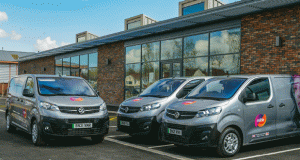Q: What was your first ever job?
My first job was on an assembly line boxing empty beer bottles before they were shipped to a distillery. It wasn’t the easiest job, as the bottles would often be hot as they came down and if you missed boxing them, they would fall to the ground and break! It was certainly an experience and health and safety would absolutely not allow people to work in the same way these days…
Q: What was you first job in the FM sector?
I moved to the UK in 1999 and used my HR and security experience to gain a role managing a security team in the docklands for a TFM service provider. This opportunity enabled me to become involved with other areas of FM and develop my skills. It was a turning point and I would say it was the start of my career.
Q: What made you choose FM as a career?
I’ve always enjoyed being behind the scenes, learning new things and working with people and so it soon became apparent that facilities was the perfect industry to utilise my skills.
Q: How did you progress through the profession to your current role?
By working hard, always being willing to learn and take on new things and by asking for new challenges and offering to take on more. I also feel like I have made some great choices with the companies I have chosen to work for. I have been given opportunities and my hard work has been rewarded and has helped me climb the career ladder. I love what I do and I wouldn’t want to do anything else.
Q: Do you have any qualifications or training in FM and related areas such as health and safety? And how have you benefited from them?
I studied HR and accounting which has enabled me to manage both people and budgets. I also have qualifications in NEBOSH.
Q: What is your greatest contribution to the FM sector, or your current role?
I feel my greatest contribution to FM has been the development of my team members over the years. I have watched some fantastic leaders come out of my teams from across all disciplines, including engineers, receptionists, administrators, cleaners, and security officers. I have seen them grow, develop their skills and progress in their careers and I’d like to think that I helped them along the way. I currently work as an Account Director for Anabas and look after three teams. I am passionate about developing people and so I am always looking for staff who want to learn and progress, so that I can provide them with the very best opportunity.
Q: What’s changed most since you started in FM?
I have seen FM become more accepted as an important part of business and also recognised as a senior strategic role. It is definitely taken more seriously as a profession now than ever before.
Q: What personal qualities do you think are most needed for a successful career in FM?
The ability to understand and communicate with people at all different levels, from the top down in any organisation. Strong time management and the ability to juggle multiple tasks is also a must. This is an industry for those who are personable, flexible and adaptable. No two days are the same, and working in FM can be challenging. It’s hard dealing with issues without being defensive and so strong communication skills are also a must, especially for those who work front of house.
Q: If you could do one thing differently in your career in FM, what would it be?
I have been lucky to work with some great people but I would have liked to have found a mentor earlier in my career to help develop, guide and teach me.
Q: Are you a member of any FM association or body and if so what benefits do you think they provide?
I am a BIFM member and feel it delivers me with access to knowledge, networking and the opportunity to meet other likeminded people in the industry. The events are often geared towards helping to widen knowledge which is really useful and practical.
Q: What advice would you give to young people coming into the profession now?
Experience as much of the industry as you can. At Anabas we have created a role called Floor Captains and this enables individuals to learn from the ground up, to practice all aspects of the job and to gain first-hand experience. Once you find out what you enjoy then pursue it. FM is not just a job it can be a long and rewarding career. Finally find a good mentor to help you to achieve your goals.
Q: What are your long-term goals for the next seven to ten years?
My long term goals are to continue to progress within the industry, to expand my knowledge and to gain even more experience. I really enjoy the operational side of my job and really want to continue to have a positive impact on the careers of others. I enjoy developing my team and watching them progress, improve and work towards becoming industry leaders. I feel like I am a natural mentor and so hope to develop as many people as I possibly can.
Q: What do you predict could be the main changes to the FM sector over the next few years?
TFM has been a huge focus over the last few years but I think there will be a move towards more businesses specialising in services. Best of breed rather than a one-stop-shop approach. I also think clients will be seeking even better value for money when procuring FM services.
Q: What are the greatest challenges of working in FM?
Being valued and being recognised as a vital and strategic role within business. FM is not just about the bricks and mortar it’s about the people and they are also one of the biggest challenges! Every day as FM’s, we also try to manage expectations, to problem solve and to be appreciated for the work that we do…
Q: What do you enjoy most about working in FM?
The people and the diversity. No two days are ever the same and I love making things happen and solving all the challenging problems which come my way every single day!




